现在完成时二
完成时的四种时态的基本结构

完成时的四种时态的基本结构完成时态是英语中最常用的时态之一,它表示过去某个时间点或时间段已经完成的动作或状态。
完成时态有四种基本结构,分别是现在完成时、过去完成时、将来完成时和完成进行时。
下面将分别介绍这四种时态的基本结构和用法。
一、现在完成时现在完成时的基本结构是“have/has + 过去分词”,其中have用于第一人称单数、第二人称单数和复数,has用于第三人称单数。
现在完成时表示过去发生的动作或状态对现在造成的影响或结果,常用于以下情况:1. 表示过去发生的动作或状态对现在造成的影响或结果,如:I have lost my keys.(我丢了我的钥匙。
)She has been studying English for five years.(她已经学习英语五年了。
)2. 表示过去发生的动作或状态一直持续到现在,如:I have lived in this city for ten years.(我在这个城市住了十年了。
) He has worked for this company since 2010.(他自2010年以来一直在这家公司工作。
)3. 表示过去发生的动作或状态与现在有关联,如:I have just finished my homework.(我刚刚完成了我的作业。
)She has already left for the airport.(她已经去机场了。
)二、过去完成时过去完成时的基本结构是“had + 过去分词”,表示在过去某个时间点或时间段之前已经完成的动作或状态。
过去完成时常用于以下情况:1. 表示过去某个时间点或时间段之前已经完成的动作或状态,如:I had finished my work before he arrived.(他到达之前我已经完成了我的工作。
)She had lived in Paris for two years before she moved to London.(她在搬到伦敦之前在巴黎住了两年。
译林牛津版八年级下册语法现在完成时二(14张)

e.g.: Tom has been in Australia for 12 years.
注意:where、home、here、there、abroad等为 副词,后面不加介词in、to。
Exercise:用have been to, have gone to, have been in 填空
7.与一般过去时的用法比较
一.现在完成时和一般过去时都是说过去的事情,
但现在完成时注意的不是事情本身,而是强调 事情与现在保持的某种密切联系(如现在的结 果,影响;一直延续到现在等);而一般过去时, 则只讲述发生在过去的动作和事情与现在没有 关系。
e.g.: I have seen film . I know the film.
fall asleep --- be asleep, get to/ arrive/reach --- be in/at+sp.
get to know --- know, get married --- be married
go (get) out --- be out put on --- wear
4. 我哥哥参加校篮球队已经两年了。 My brother has been in the school basketball team for two years.
5. 自今天早上8点钟,电视机一直开着。 The TV has been on since eight o’clock this morning.
(1). have been to 表曾经去过某地。当事人已经回来, 不在某地了。常与once、twice、次数 或ever、 never 连用。
初中英语语法现在完成时

初中英语语法现在完成时语法是英语考试中的重中之重,所占分值也多。
提高英语能力的方法是多读多练多积累。
小编在这里整理了初中英语语法现在完成时供大家阅读,希望能帮助到您。
初中英语语法现在完成时1、现在完成时的构成:现在完成时是由“助动词have/has+动词过去分词”构成的。
①助动词have/has可以与主语缩写为’ve/’s。
e.g. I have →I’ve We have → We’ve He has → He’s It has → It’s②规则变化的过去分词与动词过去式一样。
③不规则变化的动词过去分词见表。
2、现在完成时的基本句型。
①陈述句肯定形式。
e.g. I have had lunch. 我已经吃过午饭了。
He has gone to Beijing. 他去北京了。
②陈述句否定形式。
(在助动词have/has后+not,可缩写为haven’t/hasn’t)e.g. I haven’t had lunch. 我还未吃午饭。
He hasn’t gone to Beijing. 他还没有去北京。
③一般疑问句形式及其答语。
(将助动词have/has提前,答语一般用have, has回答)e.g. Have you had lunch? 你吃过午饭了没? Yes, I have. No, I haven’t.Has he gone to Beijing? 他去过北京了没有? Yes, he has. No, he hasn’t.否定回答还可以用:No, not yet. / No, never. / No, not even once等。
④特殊疑问句形式。
(疑问词+一般疑问句)e.g. Where has he gone? 他去了哪里?3、现在完成时的三个基本用法。
(1) 现在完成时的第一个基本用法表示过去发生或已完成的某一个动作对现在造成的影响或结果。
e.g. Have you had lunch? Yes, I have. I’ve just had it. 你吃过午饭没?有,吃过了,我刚刚吃的。
现在完成时的结构和用法
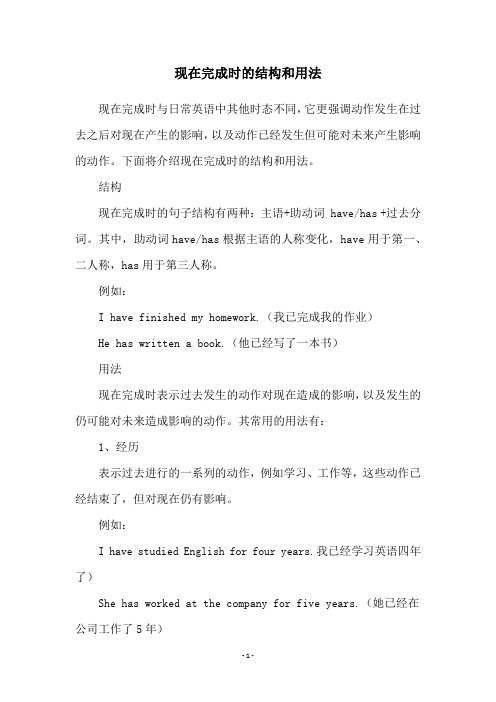
现在完成时的结构和用法现在完成时与日常英语中其他时态不同,它更强调动作发生在过去之后对现在产生的影响,以及动作已经发生但可能对未来产生影响的动作。
下面将介绍现在完成时的结构和用法。
结构现在完成时的句子结构有两种:主语+助动词 have/has +过去分词。
其中,助动词have/has根据主语的人称变化,have用于第一、二人称,has用于第三人称。
例如:I have finished my homework.(我已完成我的作业)He has written a book.(他已经写了一本书)用法现在完成时表示过去发生的动作对现在造成的影响,以及发生的仍可能对未来造成影响的动作。
其常用的用法有:1、经历表示过去进行的一系列的动作,例如学习、工作等,这些动作已经结束了,但对现在仍有影响。
例如:I have studied English for four years.我已经学习英语四年了)She has worked at the company for five years.(她已经在公司工作了5年)2、完成动作表示过去已经完成的动作,或是过去发生的动作对现在仍有影响。
例如:We have finished this project.(我们已经完成了这个项目) He has done a lot of work.(他做了很多工作)3、改变状态表示不仅发生了动作,还发生了状态的改变。
例如:She has become a teacher.(她已经成为了一名老师)He has grown up.(他已经长大了)4、近期发生的动作表示近期发生的动作,这些动作可能还没有完成,但已经发生。
例如:I have read four books this month.(这个月我已经读了四本书)She has been to Beijing.(她已经去过北京)现在完成时也可以和表示时间的状语连用,例如:just, already, already, yet, lately, recently等词,以加强句子的意义。
英语现在完成时讲解

英语现在完成时讲解英语中的现在完成时(present perfect tense)是用来描述过去发生的动作或情况与现在的关系的一种时态。
它通常用来强调过去发生的事情对现在产生的影响或结果。
在本文中,我们将详细讨论现在完成时的使用情况及其构成方式。
一、现在完成时的构成方式现在完成时的构成方式是由“助动词have/has + 动词的过去分词形式”组成。
具体使用有以下几种情况:1. 肯定句主语 + have/has + 过去分词 + 其他部分例如:- I have studied English for five years.(我已经学习英语五年了。
)- She has travelled to many countries.(她已经去过很多国家了。
)2. 否定句主语 + have/has + not + 过去分词 + 其他部分例如:- He hasn't finished his work yet.(他还没有完成工作。
)- We haven't seen each other for a long time.(我们已经很久没有见面了。
)3. 疑问句Have/Has + 主语 + 过去分词 + 其他部分?例如:- Have you ever visited Paris?(你曾经去过巴黎吗?)- Has she seen the latest movie?(她看过最新的电影吗?)二、现在完成时的使用情况现在完成时通常用于以下几种情况:1. 表示过去开始的动作一直延续至今或刚刚结束的情况。
例如:- I have lived in this city for ten years.(我在这个城市已经住了十年了。
)- They have worked on this project since last month.(他们从上个月开始就一直在做这个项目。
)2. 表示过去发生的动作对现在产生的影响或结果。
现在完成时
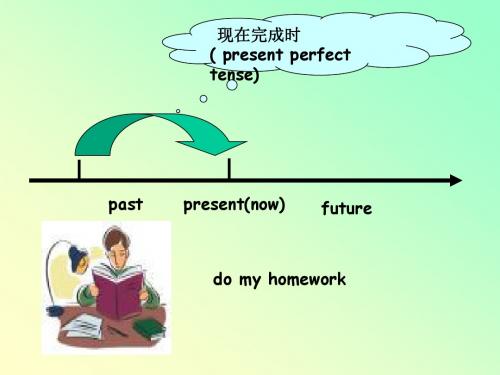
learned English ?
had your watch? studied in our school ?
How long have you
had your current hairstyle(发型)? known your best friend? worn your glasses?
按要求改变句子。 1. She has done her homework. (改否定句) She hasn’t done her homework. 2. She has already told us the news. (改否定句) She hasn’t told us the news yet. 3. The rain has already stopped. (改一般疑问句) Has the rain stopped yet? 4. I have waited here for two hours. (划线提问) How long have you waited here ? 5.He has lived in ShangHai since he left Beijing. (划线提问) Where has he lived since he left Beijing? 6. They have bought a new car, ______ __________? (反义 haven’t 疑问句) they 7. She has learned French since 2002. (同意句) for She has learned French ______ 2 years. since ago She has learned French _______ 2 years __________.
英语现在完成时专项练习题(附答案)
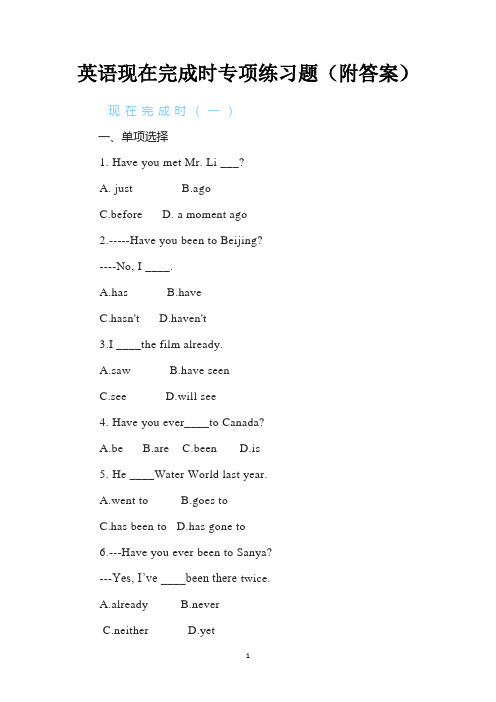
英语现在完成时专项练习题(附答案)现在完成时(一)一、单项选择1. Have you met Mr. Li ___?A. justB.agoC.beforeD. a moment ago2.-----Have you been to Beijing?----No, I ____.A.hasB.haveC.hasn'tD.haven't3.I ____the film already.A.sawB.have seenC.seeD.will see4. Have you ever____to Canada?A.beB.areC.beenD.is5. He ____Water World last year.A.went toB.goes toC.has been toD.has gone to6.---Have you ever been to Sanya?---Yes, I’ve ____been there twice.A.alreadyB.neverC.neitherD.yet7.Tom hasn’t been to Italy____, but he has ___been to America.A.already,yetB.yet,alreadyC.already,alreadyD.yet,yet8.I haven’t seen the film___.A.yetB.everC.alreadyD.just9.----What are you going to do tomorrow?-----I ___yet.A. didn’t decideB.won’t decideC.have decideD.haven’t decided10.----I have never been to Tokyo.-----____.A. So do IB.So have IC. Neither have ID. Neither do I参考答案1-5:CDBCA 6-10:ABADC二、用所给单词的适当形式填空。
现在完成时的用法总结

首先,现在完成时属于完成时这个范畴,它与过去完成时,将来完成时并列,它的结构组成为have/has+过去分词。
当我们说到各种完成时,大家都知道这个时态是强调动作“已完成”。
而现在完成时则是站在当下(即现在这一刻,这一秒)去判断一个动作,认为这个动作在当下(现在这一刻,这一秒)已经完成。
但是,请注意:即使一个动作的持续时间极短,那也是一个过程。
所以,当我们判断一个动作在当下这一刻已经完成时,我们已在潜意识中承认了这个动作是从过去开始发生的。
所以,当我们用到现在完成时的时候,我们其实已同时考虑到了过去和现在。
以上观点与现在完成时最常见的用法一密不可分,下面我们一起来看。
用法一:现在完成时用来描述与现在有联系,对现在有影响的已经完成的动作。
例如:Uncle Z is excited because he has just finished his 150,000-word essay.在这种用法中,常会出现关系从句来阐明动作之间的联系。
如上句,完成论文这个动作在说话时已经结束,但是完成论文带来的影响,即说话人的激动心情还在持续。
用法二:现在完成时用来描述已经完成的动作。
常用于用来描述最新的完成事件消息。
例如:Guess what? Uncle Z has just won the jackpot!这时,说话人使用现在完成时强调事件完成的时刻与说话的时刻很接近,这个消息是一个新闻。
用法三:现在完成时用来描述截至目前,已经重复完成过几次的动作。
例如:Uncle Z has thought about having a dog many times.在这种用法中,句中常常含有包含次数的部分,如xx times,或者如often, occasionally 这样的副词。
用法四:现在完成时用来描述从过去开始发生,并一直持续到现在的动作。
例如:Uncle Z and his best friend have known each other for 10 years.在这种用法中,常伴随出现表示一段时间的短语,如for 10 years, all day long 等等。
现在完成时态的构成与用法

现在完成时态的构成与用法现在完成时态是英语中的一种时态形式,用来表示过去某个时间点开始的动作或状态延续到现在,或者与现在有关的过去经验、经历。
本文将介绍现在完成时态的构成和用法,并提供一些例句进行解释。
一、现在完成时的构成现在完成时态的构成是由助动词“have/has”和动词的过去分词形式构成的。
1. 肯定句结构:主语 + have/has + 过去分词 + 其他....例如:- I have studied English for five years.(我已经学英语五年了。
)- She has visited Paris.(她已经去过巴黎。
)2. 否定句结构:主语 + have/has + not + 过去分词 + 其他....例如:- I have not seen him since yesterday.(自从昨天以来我就没见过他。
)- They haven't finished their homework yet.(他们还没完成作业。
)3. 疑问句结构:Have/Has + 主语 + 过去分词 + 其他...?例如:- Have you ever been to Japan?(你去过日本吗?)- Has he finished the report?(他完成报告了吗?)二、现在完成时的用法1. 表示过去发生的动作对现在造成的影响或结果。
例如:- I have lost my key.(我把钥匙弄丢了。
)- She has broken her leg.(她断了腿。
)2. 表示过去开始的动作或状态一直延续到现在。
例如:- We have lived in this house for ten years.(我们住在这个房子里已经十年了。
)- He has worked in the company since 2010.(自2010年以来他一直在这家公司工作。
)3. 表示过去经验、经历或已经完成的动作。
现在完成时的动词形式

现在完成时的动词形式现在完成时是英语中最常用的时态之一,其用法和构成都相对简单,但需要注意的是其中的动词形式。
现在完成时的动词形式有时会让初学者感到困惑,本文将对其进行详细介绍。
一、现在完成时的构成现在完成时由have/has + 过去分词构成,其中have 用于第一人称和第二人称,has用于第三人称单数。
例如:I have eaten breakfast.(我吃过早餐了。
)He has seen the movie.(他看过这部电影了。
)注意:过去分词分为不规则动词和规则动词两种。
不规则动词的过去分词需要记忆,例如:eat → eatensee → seen规则动词的过去分词通常在动词末尾加上-ed,例如:walk → walkedtalk → talked二、现在完成时的用法1. 表示从过去某个时间一直延续到现在的动作或状态。
例如:I have lived in New York for 10 years.(我在纽约住了10年了。
)He has been studying English for 3 years.(他学英语已经3年了。
)2. 表示过去某个时间已经完成了的动作或状态对现在的影响。
例如:I have finished my homework, so I can go out now.(我做完了作业,现在可以出去了。
)He has lost his keys, so he can’t get into the house.(他丢了钥匙,无法进入房子。
)3. 表示经历过的经历或事情。
例如:I have been to China twice.(我去过中国两次。
)She has read that book before.(她以前读过那本书。
)三、现在完成时的动词形式1. 主动语态现在完成时的主动语态是由have/has + 过去分词构成,如前所述。
需要注意的是,过去分词的形式是不变的,与时态和人称没有关系,例如:We have seen the movie.(我们看过这部电影了。
现在完成时之二:Since和for的用法
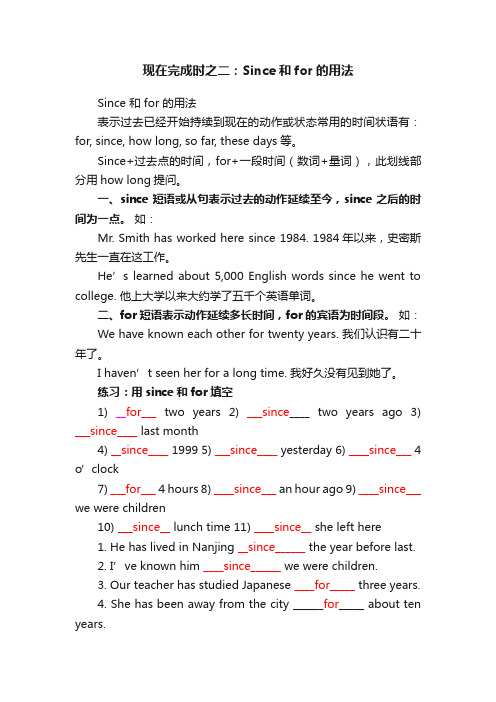
现在完成时之二:Since和for的用法Since 和 for 的用法表示过去已经开始持续到现在的动作或状态常用的时间状语有:for, since, how long, so far, these days等。
Since+过去点的时间,for+一段时间(数词+量词),此划线部分用how long提问。
一、since短语或从句表示过去的动作延续至今,since之后的时间为一点。
如:Mr. Smith has worked here since 1984. 1984年以来,史密斯先生一直在这工作。
He’s learned about 5,000 English words since he went to college. 他上大学以来大约学了五千个英语单词。
二、for短语表示动作延续多长时间,for的宾语为时间段。
如:We have known each other for twenty years. 我们认识有二十年了。
I haven’t seen her for a long time. 我好久没有见到她了。
练习:用since和for填空1) __for___two years 2) ___since____ two years ago 3) ___since____ last month4) __since____ 1999 5) ___since____ yesterday 6) ____since___ 4 o’clock7) ___for___ 4 hours 8) ____since___ an hour ago 9) ____since___ we were children10) ___since__ lunch time 11) ____since__ she left here1. He has lived in Nanjing __since______ the year before last.2. I’ve known him ____since______ we were children.3. Our teacher has studied Japanese ____for_____ three years.4. She has been away from the city ______for_____ about ten years.5. It’s about ten years ______since____ she left the city.2.短暂性转换延续性①arrive at/in sw. get to/reach sw. come/go/move to sw.→ be in sw./at school/at home/on the farm/be here/be there 1) He got to Beijing five minutes ago.He has gotten to Beijing for 5 minutes.2) I moved to the USA last year.I have moved to the USA since last year.3) I went home yesterday.I have gone home for 2 days.4) They came here last week.They have come here since last week.②come/go back, return → be back come/go out → be out1) He came out (出来)two years ago.He has come out for 2 years.2) We return(返回) to Fuzhou yesterday.We have been back to Fuzhou since yesterday.③become → be1) I became a teacher in 2000.I ________ __________ a teacher for _________ _________.2) The river became dirty last year.The river _________ _________ dirty for _________ __________.④close → be closed open → be open1) The shop closed two hours ago.The shop ________ _________ _________ for _________ _________.2) The door opened at six in the morning.The door ________ ________ ________ for six hours.⑤get up → be up die → be deadleave sw. → be away from sw.fall asleep/get tot sleep → be asleepfinish/end → be over marry → be married1) I got up two hours ago.I ________ ________ ________ since ________ ________.2) He left Fuzhou just now.He _______ ________ ________ _________ Fuzhou for five minutes.3) My grandpa died in 2002.My grandpa _______ _______ ________for _______ ________.4) The meeting finished at six.The meeting ________ ______ ______ for six hours.5) I got to sleep two hours ago.I ________ _________ _________ since _________ __________.6) They married in 1990.They ________ _________ __________since _________.⑥start/begin to do sth. → do sth. begin → be on1) I began to teach at this school in 1995.I ____ ____ at this school since ____.2) The film began two minutes ago.The film ____ ____ ____ for ____ ____.⑦borrow → keep lose → not have buy → have put on → wear catch/get a cold → have a cold get to know → know1) They borrowed it last week.They _________ _________ it since __________ __________.2) I bought a pen two hours ago.I _________ _________ a pen for ________ __________.3) I got to know him last year.I _________ __________ him since __________ __________.4) I put on my glasses three years ago.I __________ __________ my glasses for _________ _________.⑧have/has gone to → have been in1) He has gone to Beijing.He ____ ____ _____ Beijing for two days.⑨join the league/the Party/the army→ be a league/a Party member/a soldier→ be a member of the league/the Party→ be in the league/the Party/the army1) He joined the league in 2002.He ________ _________ a _________ _________ for two years.He ________ __________ a __________ ___________ the __________ for two years.He ____________ ___________ ___________ the league for two years.2) My brother joined the army two years ago.My brother __________ __________ a ___________ for ___________ ___________.My brother ___________ ___________ in ____________ ___________ for two years.3.汉译英1)这本字典我已买了三年了。
现在完成时的结构和用法
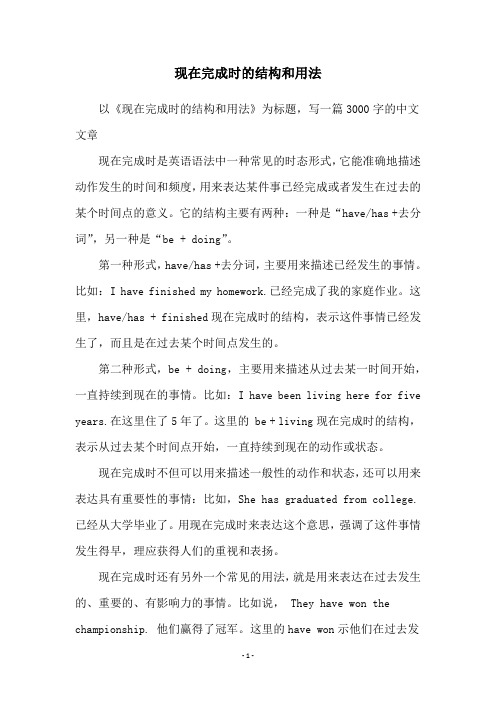
现在完成时的结构和用法以《现在完成时的结构和用法》为标题,写一篇3000字的中文文章现在完成时是英语语法中一种常见的时态形式,它能准确地描述动作发生的时间和频度,用来表达某件事已经完成或者发生在过去的某个时间点的意义。
它的结构主要有两种:一种是“have/has +去分词”,另一种是“be + doing”。
第一种形式,have/has +去分词,主要用来描述已经发生的事情。
比如:I have finished my homework.已经完成了我的家庭作业。
这里,have/has + finished现在完成时的结构,表示这件事情已经发生了,而且是在过去某个时间点发生的。
第二种形式,be + doing,主要用来描述从过去某一时间开始,一直持续到现在的事情。
比如:I have been living here for five years.在这里住了5年了。
这里的 be + living现在完成时的结构,表示从过去某个时间点开始,一直持续到现在的动作或状态。
现在完成时不但可以用来描述一般性的动作和状态,还可以用来表达具有重要性的事情:比如,She has graduated from college.已经从大学毕业了。
用现在完成时来表达这个意思,强调了这件事情发生得早,理应获得人们的重视和表扬。
现在完成时还有另外一个常见的用法,就是用来表达在过去发生的、重要的、有影响力的事情。
比如说, They have won the championship. 他们赢得了冠军。
这里的have won示他们在过去发生的重要的事情,给听者传递出他们取得很大成就的意思。
现在完成时的使用方面,一般有三种情况:一是指过去某个具体的时时间,比如: We have visited the Forbidden City three times this month.们这个月已经去参观故宫三次了;二是指过去某一段比较长的时间,比如:He has been working here for three years. 他在这里工作已经三年了;三是指从过去到现在一直持续的动作,比如:I have been learning English for ten years.已经学习英语十年了。
现在完成时的结构和用法

现在完成时的结构和用法现在完成时是英语中经常使用的一种时态。
它表示在过去某一段时间内发生或完成的动作,又称过去完成时。
它由助动词have/has +去分词构成,通常用来表示过去发生的动作对现在产生了某种影响或结果。
它可以表示过去的一段时间,如今天早上、昨天、上个月、去年这种更长的时间,也可以表示过去特定的一点时间,如刚才、一会儿前这种更短的时间。
现在完成时的用法有以下几种:一、表示动作发生的时间表示某一段过去的时间内发生的动作。
例如:I have been to Beijing twice this year. 今年我已经去了北京两次了。
二、表示过去经常发生的动作表示过去一直以来经常发生的动作。
例如:I have lived in this city for ten years.已经在这个城市住了十年了。
三、表示过去发生的动作结果对现在产生的影响表示过去的某一动作结果对现在产生了某种影响。
例如:I have finished my homework.已经完成作业了。
四、表示刚刚做完的动作表示刚刚完成的动作。
例如:I have just drunk a cup of coffee.刚刚喝了一杯咖啡。
现在完成时在英语中的使用非常普遍,用来描述发生在过去某一段时间内的动作,以及那些动作对现在造成的影响。
它是表达准确、简洁和连贯的重要方式。
熟练掌握它可以帮助大家更轻松、更有效地表达自己的观点和见解,也可以帮助大家在日常的语言交流中更准确、更自如地表达自己的思想。
例句:1. I have been busy all day.一整天都很忙。
2. She has taken a lot of photos for us.给我们拍了很多照片。
3. I have already spoken to him about it.已经和他谈过这件事了。
4. We have had a good time.们过得很开心。
现在完成时

现在完成时(一):开始于过去的动作一直持续到现在,有可能继续持续。
谓语动词为延续性动词 I have lived here for 3 years. 我仍然住在这里,而且还可能继续住下去。
如果在搬家时说这句话,则live这件事只持续到目前为止。
The teacher has taught in this school since I came here.I’ve worked in this company since I left school.since表明了动作开始的时间点。
有上下问明确告知,动作只持续到说话的时刻为止。
a. A: Have you waited long?B: I’ve waited for three hours.b. I’ve waited for him all day; I don’t want to wait any longer.特点:1. 谓语动词为延续性动词2. 动作的发生时间是过去,持续到现在,还可能继续持续下去。
3. 常常与表示一段时间的时间状语连用,是说明某个状态持续了多久。
与现在完成时搭配的时间状语1. since + 时间点a. I’ve worked in thiss company since 1980b. I’ve worked in this company since I left school. (从句中一般过去时)2. for + 时间段a. I’ve worked in this company for three years.b. Great changes have taken place in Beijing for the past few years.3. 到目前为止:until now, up until now, up to now, up till now, so far.a. We have up until now failed to take any action to decide on a common language that would further communication between nations.4. 在最近几世纪/年/月以来:in the past few years, over the past few years, during the last three months, for the last few centuries, through centuries, throughout history.a. Throughout history man has had to accept the fact that all living things must die, for the very nature of life includes death.b. Through centuries the bizarre anticss of sleepwalkers have puzzled police, perplexed scientists anad fascinated writers.现在完成时(二):过去发生但与现在仍有联系的动作或状态a. He has broken his leg. 他现在还在医院,所以不能和同学一起郊游。
现在完成时态及一般过去时态 区别
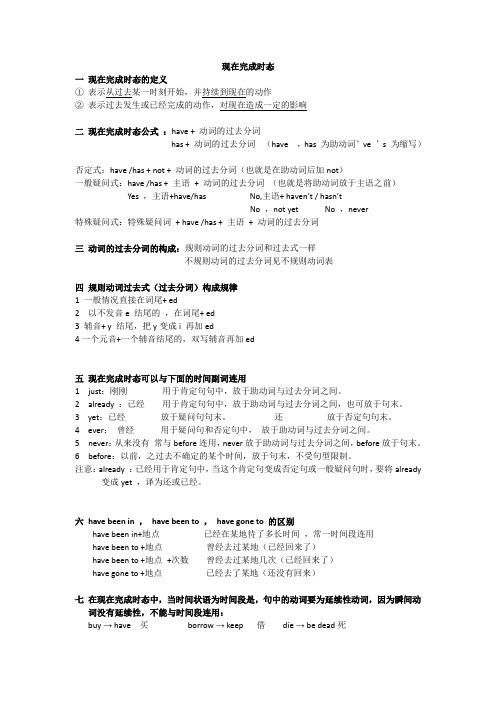
现在完成时态一现在完成时态的定义①表示从过去某一时刻开始,并持续到现在的动作②表示过去发生或已经完成的动作,对现在造成一定的影响二现在完成时态公式:have + 动词的过去分词has + 动词的过去分词(have ,has 为助动词’ve ’s 为缩写)否定式:have /has + not + 动词的过去分词(也就是在助动词后加not)一般疑问式:have /has + 主语+ 动词的过去分词(也就是将助动词放于主语之前)Yes ,主语+have/has No,主语+ haven’t / hasn’tNo ,not yet No ,never特殊疑问式:特殊疑问词+ have /has + 主语+ 动词的过去分词三动词的过去分词的构成:规则动词的过去分词和过去式一样不规则动词的过去分词见不规则动词表四规则动词过去式(过去分词)构成规律1 一般情况直接在词尾+ ed2 以不发音e 结尾的,在词尾+ ed3 辅音+ y 结尾,把y变成i 再加ed4一个元音+一个辅音结尾的,双写辅音再加ed五现在完成时态可以与下面的时间副词连用1 just:刚刚用于肯定句句中,放于助动词与过去分词之间。
2 already :已经用于肯定句句中,放于助动词与过去分词之间,也可放于句末。
3 yet:已经放于疑问句句末。
还放于否定句句末。
4 ever:曾经用于疑问句和否定句中,放于助动词与过去分词之间。
5 never:从来没有常与before连用,never放于助动词与过去分词之间,before放于句末。
6 before:以前,之过去不确定的某个时间,放于句末,不受句型限制。
注意:already :已经用于肯定句中,当这个肯定句变成否定句或一般疑问句时,要将already 变成yet ,译为还或已经。
六have been in ,have been to ,have gone to 的区别have been in+地点已经在某地待了多长时间,常一时间段连用have been to +地点曾经去过某地(已经回来了)have been to +地点+次数曾经去过某地几次(已经回来了)have gone to +地点已经去了某地(还没有回来)七在现在完成时态中,当时间状语为时间段是,句中的动词要为延续性动词,因为瞬间动词没有延续性,不能与时间段连用:buy → have 买borrow → keep 借die → be dead死fall ill → be ill 生病leave→ be away from 离开close → be closed 关open → be open 开Marry → be married 结婚join → be a member of ...加入八It’s the first / second time that + 现在完成时态从句It’s the... that + 现在完成时态从句九现在完成时态,一般过去时态的区别Jane has been in Beijing since 2002 自从2002年以来间就住在北京Jane was in Beijing in 2002 2002年间住在北京We have just cleaned the classroom 我们刚刚打扫好了教室(说明教室现在很干净)We cleaned the classroom 我们打扫了教室(不知道教室现在是否干净)I have already finished my homework 我已经完成了我的家庭作业I have finished my homework already 我已经完成了我的家庭作业I haven’t finished my homework yet 我还没有完成了我的家庭作业Have you finished your homework yet?你已经完成了你的家庭作业了吗?Have you ever been to HongKong ?你曾经去过香港吗?I haven’t ever spoken to him 我没有和他说过话I have never spoken to him before 我从来没有和他说过话I have never been to Shanghai before 我从来没有去过上海She has worked here since 2000 自从2000年她一直在这里工作She has worked here since 18 years ago 自从18年以前她就在这里工作She has worked here for 18 years 她在这里工作18年It’s 18 years since she began to work here 自从她开始在这里工作已经18年了I haven’t seen him for 3 years 我已经3年没有见过他了I haven’t seen him since 3 years ago 自从3年前我就没有见过他了I haven’t seen him since 2015 自从2015年我就没有见过他了It’s 3 years since I saw him last time 自从我上次见过他已经3年了We have learned two thousand words so far 到目前为止我们已经学了2千个单词We have learned two thousand words in the past two years在过去的两年我们已经学习了2千个单词了I have bought this bike for three years 我已经买了这辆自行车三年了(错)I have had this bike for three years 我已经买了这辆自行车三年了(对)This shop has closed since last month 自从上个月这个店就关门了(错)This shop has been closed since last month 自从上个月这个店就关门了(对)It’s the first time that I have visited the city 这是我第一次参观这个城市It’s the best film that I have ever seen 这是我看过的最好的一部电影She has been to Guiyang 她曾经去过贵阳(现在不在贵阳了)She has gone to Guiyang 她去贵阳了(现在在贵阳)She has been to Guiyang twice 她曾经去过贵阳两次She has been in Guiyang for three months 她在贵阳有3个月了练习题:I.用所给动词的适当形式填空。
现在完成时使用例句
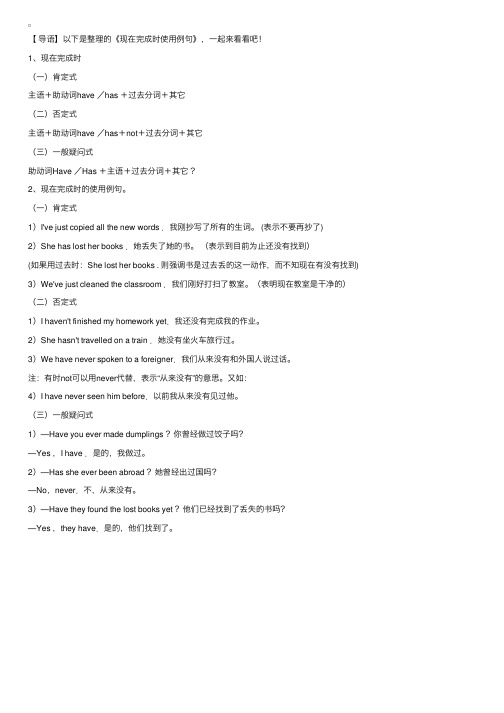
【导语】以下是整理的《现在完成时使⽤例句》,⼀起来看看吧!1、现在完成时(⼀)肯定式主语+助动词have /has +过去分词+其它(⼆)否定式主语+助动词have /has+not+过去分词+其它(三)⼀般疑问式助动词Have /Has +主语+过去分词+其它?2、现在完成时的使⽤例句。
(⼀)肯定式1)I've just copied all the new words .我刚抄写了所有的⽣词。
(表⽰不要再抄了)2)She has lost her books .她丢失了她的书。
(表⽰到⽬前为⽌还没有找到)(如果⽤过去时:She lost her books . 则强调书是过去丢的这⼀动作,⽽不知现在有没有找到) 3)We've just cleaned the classroom .我们刚好打扫了教室。
(表明现在教室是⼲净的)(⼆)否定式1)I haven't finished my homework yet.我还没有完成我的作业。
2)She hasn't travelled on a train .她没有坐⽕车旅⾏过。
3)We have never spoken to a foreigner.我们从来没有和外国⼈说过话。
注:有时not可以⽤never代替,表⽰“从来没有”的意思。
⼜如:4)I have never seen him before.以前我从来没有见过他。
(三)⼀般疑问式1)—Have you ever made dumplings ?你曾经做过饺⼦吗?—Yes ,I have .是的,我做过。
2)—Has she ever been abroad ?她曾经出过国吗?—No,never.不,从来没有。
3)—Have they found the lost books yet ?他们已经找到了丢失的书吗?—Yes ,they have.是的,他们找到了。
现在完成时的特殊用法
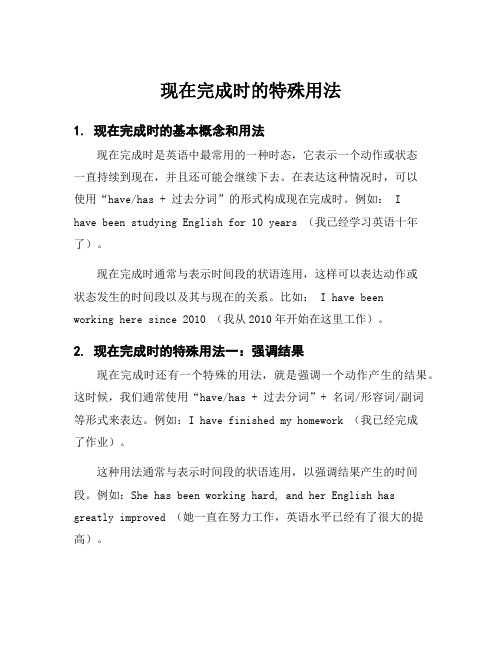
现在完成时的特殊用法1. 现在完成时的基本概念和用法现在完成时是英语中最常用的一种时态,它表示一个动作或状态一直持续到现在,并且还可能会继续下去。
在表达这种情况时,可以使用“have/has + 过去分词”的形式构成现在完成时。
例如: Ihave been studying English for 10 years (我已经学习英语十年了)。
现在完成时通常与表示时间段的状语连用,这样可以表达动作或状态发生的时间段以及其与现在的关系。
比如: I have beenworking here since 2010 (我从2010年开始在这里工作)。
2. 现在完成时的特殊用法一:强调结果现在完成时还有一个特殊的用法,就是强调一个动作产生的结果。
这时候,我们通常使用“have/has + 过去分词”+ 名词/形容词/副词等形式来表达。
例如:I have finished my homework (我已经完成了作业)。
这种用法通常与表示时间段的状语连用,以强调结果产生的时间段。
例如:She has been working hard, and her English has greatly improved (她一直在努力工作,英语水平已经有了很大的提高)。
3. 现在完成时的特殊用法二:经验现在完成时还有一个特殊的用法,就是表达一个人的经验。
这时候,我们通常使用“have/has + 过去分词”+ ever/never等形式来表达。
例如:We have never been to Paris (我们从未去过巴黎)。
这种用法通常表达对某个事情的经验或者对某种状态的感受。
例如:I have never felt so alive (我从未感觉如此活着)。
4. 现在完成时的特殊用法三:动作的反复或延续状态现在完成时还有一个特殊的用法,就是表示一个动作的反复或一个状态的延续。
这时候,我们通常使用“have/has + been + 过去分词”的形式来表达。
初三英语专项辅导五——现在完成时(二)
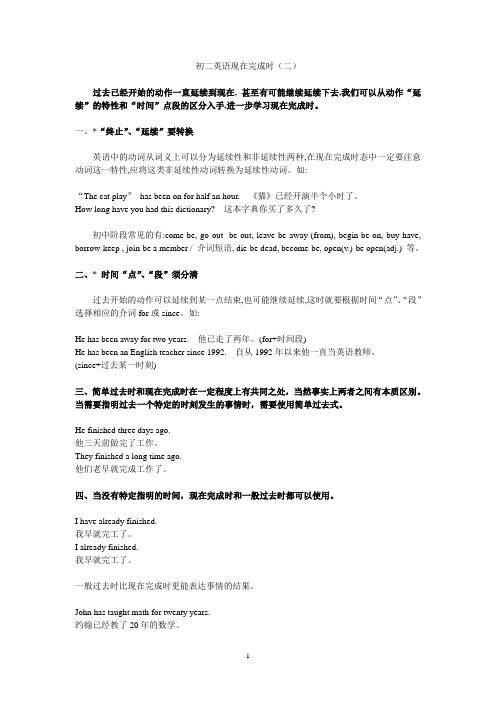
初二英语现在完成时(二)过去已经开始的动作一直延续到现在, 甚至有可能继续延续下去,我们可以从动作“延续”的特性和“时间”点段的区分入手,进一步学习现在完成时。
一、*“终止”、“延续”要转换英语中的动词从词义上可以分为延续性和非延续性两种,在现在完成时态中一定要注意动词这一特性,应将这类非延续性动词转换为延续性动词。
如:“The cat play”has been on for half an hour.《猫》已经开演半个小时了。
How long have you had this dictionary?这本字典你买了多久了?初中阶段常见的有:come-be, go out -be out, leave-be away (from), begin-be on, buy-have, borrow-keep , join-be a member / 介词短语, die-be dead, become-be, open(v.)-be open(adj.) 等。
二、* 时间“点”、“段”须分清过去开始的动作可以延续到某一点结束,也可能继续延续,这时就要根据时间“点”、“段”选择相应的介词for或since。
如:He has been away for two years.他已走了两年。
(for+时间段)He has been an English teacher since 1992.自从1992年以来他一直当英语教师。
(since+过去某一时刻)三、简单过去时和现在完成时在一定程度上有共同之处,当然事实上两者之间有本质区别。
当需要指明过去一个特定的时刻发生的事情时,需要使用简单过去式。
He finished three days ago.他三天前做完了工作。
They finished a long time ago.他们老早就完成工作了。
四、当没有特定指明的时间,现在完成时和一般过去时都可以使用。
I have already finished.我早就完工了。
- 1、下载文档前请自行甄别文档内容的完整性,平台不提供额外的编辑、内容补充、找答案等附加服务。
- 2、"仅部分预览"的文档,不可在线预览部分如存在完整性等问题,可反馈申请退款(可完整预览的文档不适用该条件!)。
- 3、如文档侵犯您的权益,请联系客服反馈,我们会尽快为您处理(人工客服工作时间:9:00-18:30)。
buy go to got to join have/has had leave have/has been away have/has kept have/has been on have/has been over
come to
have/has been in borrow have/has been in begin have/has been in finish
3.表示一直持续到现在的状态 The meeting has lasted five days. 4.在时间状语从句,条件状语从句或让步状语从句中表达将来某时已 经完成的动作 When you have learned English, you will find it a bridge to so much knowledge. We’ll start at six if it has stopped raining by then. ※这里的现在完成时强调从句动作在主句动作之前完成, 如果两个 动作同时或几乎同时发生, 则不必用完成时 .试比较: I’ll let you know as soon as I hear from her. She will call you when she gets home. 5.特殊句型: It’s the first time that… have/has done…. It has been/is + 时间段 +since …. This is the best film that I have ever seen. 6.短暂性动词的完成时不与时间段连用, 如需连用可转化成相应的
Key words
yet
already
ever
never
注意: ever 曾经
用于疑问句中
never 从不 带有否定意义
Have been A: _______ you ever _______ to the park? ( be )
B: No, never.
Key words
yet
just
already
come to
Ann has gone to China since three months ago.
been in
buy go to have/has had have/has been in have/has been in
come to
My brother has joined the army for five years.
I have left Shanghai for 3 days.
been away for 3 days.
buy go to got to join have/has had have/has been in have/has been in have/has been in leave have/has been away
现在完成时
功能:
He has had a big breakfast.
He is full .
1.过去某一时间点发生的动作对现在产生影响。
I have learned English for ten years
2.过去某一时间点发生的动作持续 到现在或还将持续下去。
基本结构 have / has + done
method 2: It is + 时间段 since +一般过去时的句子.
1. 他的爷爷已经去世2年了。
It is 2 years since his grandpa died. 2. Nick 参军3年了.
It is 3 years since Nick joined the army. 3. 他离开深圳好长时间了。 It is a long time since he left Shenzhen. 4. 这本书我已借了4个月了. It is 4 months since I borrowed the book .
join
be in be a …member
She has bought the computer for two years.
had
buy have/has had
How long have you come to the United States?
been in
buy have/has had have/has been in
have/has been in
have/has been a soldier
His dog has died for two years .
been dead
buy go to got to join have/has had leave have/has been away have/has kept have/has been on have/has been over have/has been dead come to have/has been in borrow have/has been in begin have/has been in finish have/has been in die
A: Where is Bob ? has gone to Japan with B: He ____________ his sister.
have/has gone to have/has been to have/has been in 去了 说话时某人不在 只用于第三人称 去过 常与ever, never, once,twice,连用 在… 与时间段连用 用how long 提问
ever
never since
for
+ 一段时间
have you ________ taught A: How long ______ in this school? (teach )
B: For 6 years.
Key words
yet for
already ever just
never since
been in
buy go to got to join have/has had have/has been in have/has been in have/has been in have/has been in
been a soldier
come to
have/has been a soldier
Have you ever ________ been to the city ? A: _____
B: No , never .
know
have known each We ____________ other since childhood .
knew We ____________ each other when we were young .
come to
have/has been in borrow
have/has been a soldier
The film has begun for 10 minutes.
been on
buy go to got to join have/has had leave have/has been away have/has kept have/has been on
have/has been a soldier
have gone to
have been to
have been in
去了某地 去过某地已经回来 一直留在某地 还没回来不与 常与ever, never, 与for / since连用 只用于第三人称 once,twice,连用 用how long 提问
saw I ________ him just now . (see)
have just _____ my pen. I _____ (lose)
have you ______ lived How long ______ in the United states ? (live)
did move When _____ you ______ here ? (move)
did see the film ? A: When______ you ______ saw it two months ago. (see) B: I ____
has finished The writer ________________ several story-books since 5 years ago. (finish)
yet
already
ever
never
since
since 后面带过去时间或有一般过去时的句子
has worked Tom ___________ in the factory since he left school ten years ago. (work )
Key words
yet
already
Key words
yet
already
注意:already 用于肯定句,
yet 用于疑问句和否定句中
Has your brother ______ finished his A: ______ homework yet? (finish)
B: Yes, he ‘s already done it.
come to
have/has been in borrow have/has been in begin have/has been in
have/has been in
have/has been a soldier
The concert has finished for half an hour.
